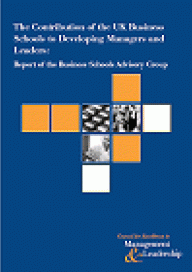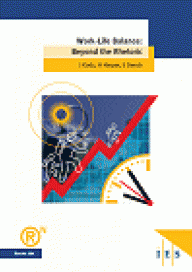Publications
 We author and publish a range of resources to keep you up to date with the latest developments in employment, labour market and human resource policy and practice.
We author and publish a range of resources to keep you up to date with the latest developments in employment, labour market and human resource policy and practice.
All our pdf publications are free to access.
Search results
-
📄
SET for Success: the Report of Sir Gareth Roberts' Review
The supply of people with science, technology, engineering and mathematical skills
Roberts G | Mar 2002 | HM TreasuryThe Review identified a number of issues in school, further and higher education, as well as in the labour market for science and engineering skills, that needed to be addressed in order to secure a strong future supply of scientists and engineers in the UK. The recommendations set out in this report are designed to help secure a strong supply of people with science and engineering skills.
-

The Contribution of the UK Business Schools to Developing Managers and Leaders
Report of the Business Schools Advisory Group
Hirsh W, Watson S | Mar 2002 | Institute for Employment StudiesThe Business Schools Advisory Group of the Council for Excellence in Management and Leadership was convened to examine the quality, relevance and accessibility of all forms of management and leadership education delivered by UK Business Schools, and to identify any gaps between what the Business Schools currently supply and what is needed.
-
📄
Productivity: Where HR Fears to Tread?
Robinson D | Feb 2002 | Institute for Employment StudiesThis article discusses productivity from several angles: how it is measured, the history of the concept, some 'productivity problems', the relationship of productivity to the various initiatives designed to improve organisational performance, and the role played by HR.
-

Work-Life Balance: Beyond the Rhetoric
Kodz J, Harper H, Dench S | Feb 2002 | Institute for Employment StudiesMany employers now recognise that work-life balance is a key issue and offer employees a range of flexible working options. Nevertheless, take-up of these options remains low. The perceived impact on career prospects, as well as a number of other factors, can be off-putting for employees. Individuals and their managers therefore need to be supported to get over some of the difficulties and barriers they experience to ensure work-life balance policies and practices work effectively.
-
📄
How Employers and Service Providers are Responding to the Disability Discrimination Act 1995
Stewart N, Watson A, Williams J, Further analysis by Meager N, Lain D | Feb 2002 | Department for Work and PensionsThis report presents findings of research conducted with employers and service providers, which examined how they were responding to the Disability Discrimination Act 1995. Based on a telephone survey and in-depth case studies, the research explores responses to the Act in the areas of recruitment, employment, service provision, making adjustments for disabled customers/employees, and awareness of the Act and sources of advice and information. The research was conducted by researchers at SWA Consulting Ltd with Scantel International, and includes further analysis by the Institute for Employment Studies.
-
📄
Barriers to Employment for Disabled People
Goldstone C. Further analysis by Meager N | Feb 2002 | Department for Work and PensionsThis report presents findings of a survey conducted with 2,008 employers aimed at identifying and examining the barriers to employment which disabled people face. The study compares findings with earlier research conducted amongst employers, to chart transitions over time, and explores three key areas: the existence and nature of policies relating to the employment of disabled people; employers' practices with regard to disabled people in the workplace; and employers' awareness of and responses to government initiatives and legislation, in particular the Disability Discrimination Act 1995.
-
📄
Awareness, Knowledge and Exercise of Individual Employment Rights
Meager N, Tyers C, Perryman S, Rick J, Willison R | Feb 2002 | Department of Trade and IndustryThis report presents the findings of a nationally representative telephone survey of 1,000 economically active people of working age (males 16-64, females 16-59), focusing on their levels of awareness and knowledge of employment rights and their exercise of those rights.
-
📄
The Agile Manager
Tamkin P | Feb 2002 | Institute for Employment StudiesThis briefing attempts to disentangle the key trends about how work is changing from the rhetoric, and distil the hype to the essential truths. We spoke with leading HR managers about the changes they see in their organisations and the impact of technology on management and leadership. We looked at 'futures' studies, to make sense of what is being predicted for organisations and what this means for managers within them.
-
📄
Job Families and Other Taxonomies
Robinson D | Feb 2002 | Institute for Employment StudiesThis paper has been written following discussions with IES colleagues, and informed further by a literature search on the subject of job families. All our member organisations use a variety of employee taxonomies and several have experimented with the job family approach. We are interested in what works, and what does not, and in the organisational factors that need to be in place for an employee taxonomy to be usable and useful.
-
📄
How Can We Manage Work-Related Stress?
Thomson L | Feb 2002 | Institute for Employment StudiesOver the past decade, organisations have become increasingly aware of the need to manage stress. There have been two drivers for this. The first is the need for a motivated and productive workforce, where the negative effects of stress on attendance, performance, job satisfaction and commitment are minimised. The second is an organisation's legal responsibilities for the care of their employees.
